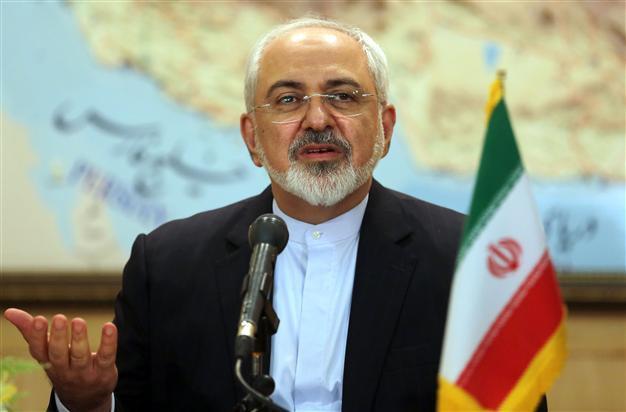Iran accord to ‘fuel up’ Turkey’s energy sector
Merve Erdil - ISTANBUL

Iranian Foreign Minister Mohammad Javad Zarif and the head of Iran's Atomic Energy Organization Ali Akbar Salehi (unseen) give a press conference at Tehran's Mehrabad Airport following their arrival on July 15, 2015, after Iran's nuclear negotiating team struck a deal with world powers in Vienna. AFP Photo
The international deal over Iran’s nuclear program will boost Turkey’s energy sector as oil prices will drop and gas imports from Iran to Turkey might increase, according to sector representatives, who predict that Turkey may even buy more Iranian oil than it did before Tehran was hit by sanctions.
Iran and six world powers struck a nuclear agreement on July 14, under which “sanctions imposed by the United States, European Union and United Nations will be lifted in return for Iran agreeing long-term curbs on a nuclear program.”
While the lifting of sanctions remains dependent on smooth progress in Iranian facilities inspections, focus has turned to the future of the country’s huge energy resources.
Turkish Finance Minister Mehmet Şimşek has said the deal is “great news” for the Turkish economy as it would likely boost bilateral trade, while Energy Minister Taner Yıldız has said it could “unlock investment” in Iran.
Iran has the world’s second largest gas supplies and its fourth largest oil supplies. It is Turkey’s second top gas provider after Russia, exporting around 10 billion cubic meters of gas (bcm) across the border annually. Turkey also meets around 30 percent of its oil demand with Iranian resources, despite the sanctions on the country.
Sector representatives now predict that Turkey’s energy imports from Iran could increase dramatically as a result of the agreement.
Before sanctions were imposed, Turkey had met almost half of its oil demand from Iran. After the sanctions, Turkey slashed its imports from the country dramatically and turned to other countries, including Iraq. Imports from Iran totaled 5.2 million tons last year, down from 9.7 million tons in 2011.
While an increase in Iran’s oil exports will help the country overcome its economic problems, such a rise should not be expected immediately, Caspian Strategy Institute’s Istanbul Energy Program Coordinator Emin Emrah Danış said.
Bosphorus Energy Club President Mehmet Öğütçü, meanwhile, suggested that gas discounts were in the offing for Turkey.
“Turkey today pays the highest gas price to Iran. Iran signaled potential gas discounts if Turkey buys more gas. It is even willing to sell its Southern Persian gas to Europe through Turkey … So Turkey is set to be particularly important for Iranian gas,” said Öğütçü.
He noted that the method of how sanctions are lifted must be closely monitored in order to see the new economic climate in Iran.
“Many multinationals have already started to reflect on what they can do in the Iranian market. It will, however, be too optimistic to expect any significant fund flows to the country in the short term. At the beginning, small- and medium-sized enterprises will enter the country and they will pave the road for the multinationals,” Öğütçü added.
